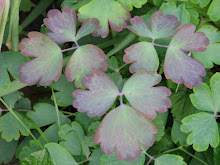
The peonies are popped...

…and my Endless Summer hydrangea is unfurling more delicate pink petals every day.

I love cottage gardens, but I don’t have the space for a real one. In my tiny yard, I like routine and predictability, and plant my garden accordingly. I study garden guides to ensure that I have a nice balance of complementary colors. Each plot of newly-sown seeds is carefully labeled, watered, and watched.
Every year, however, one plot fails to thrive…usually a simple, carefree plant, the type recommended for small children just learning about gardening. This year, for me, it’s dill. Weeks of care but not a seedling in sight (“It’s dill-iberate,” I groused to my husband).
However, in another plot, something mysteriously flourished. I knew it wasn't a weed, but I had to study it for a week or so to determine its true identity.

Hollyhocks!
I haven’t planted hollyhocks for 2 years. This year, however, dozens of them…uninvited, unlabeled, uncared for…are sprouting in my flower beds and even, mysteriously, my container gardens. Lusty, healthy, and thriving, and growing far more quickly than my coddled marigolds and zinnias. How did they get there? I don’t know, but I’m sure glad to see them.

I was surprised by this patch of lettuce in my container garden, which apparently reseeded with no help from me. It came back on its own, and so did parsley and thyme…and a rogue patch of dill!

Lots of these little surprises around, which must be plucked quickly if I don’t want a forest of maple trees in my back yard. I think they’re quite beautiful, though, and it’s so interesting to see how they’ve grown out of their little kidney-shaped seeds.
The promise of new life!

So much time in the garden has influenced my knitting habits this week. I put aside my red stockings and started knitting a hat from the skein of vibrant green yarn (Cascade 220 in the Ireland colorway) I got last week. The hat is criss-crossed with cables and a leaf motif. The pattern is Ysolda Teague’s Snapdragon Tam and although I’m knitting a winter item, using my bright green yarn to knit little leaves feels quite summery. You can see the little leaves forming out of the hat brim if you look closely.

Of course, I’ve been in the kitchen too. I’d planned on making a fun dessert this week, but the desire to try another sourdough recipe before storing it in the refrigerator won out over the desire for something sweet. I decided to make some English muffins, but didn’t want to use a two-day recipe. I’m a big fan of instant gratification, and although I could stand to learn some patience, I’m not about to start with my kitchen. I found a great recipe in the Best of the Best of Alaska cookbook and tweaked it just a bit.
Same-Day Sourdough English Muffins
1 teaspoon dry yeast
1/4 cup warm water
1/2 cup warm milk
1 1/2 cup sourdough starter
1/4 teaspoon baking soda
1 teaspoon salt
3 - 3 1/2 cups flour (I used half white and half wheat)
3 tablespoons melted butter
First I took measured out my lively sourdough starter...

…and mixed it with the warm milk, baking soda, salt, and 2 cups of flour. I let it rise for an hour, and then mixed in the yeast, butter, additional cup of flour, and a bit of water, and then gave it another one hour rise. You want a dough that’s not too dry, but not so wet and sticky that it clings to your fingers. You can play with a water-flour ratio until it feels right.
A note: the recipe asks you to add the yeast before the first rise, but I’d hoped my sourdough was active enough to rise without the yeast. However, my dough wasn’t wet enough and didn’t rise very much. It got a nice rise after adding the yeast, of course, and its late entry didn’t affect the taste one bit!
I rolled the dough to ¾ inch thickness and cut out the muffins. If you don’t have English muffin molds like these, you can use an empty tuna can.

Once you have them all cut out nicely…

…grease and heat a griddle. It needs to be fairly hot, but not so hot it will burn your muffins. Once droplets of water sizzle on its surface, it’s ready to go. Drop your muffins on and brown each side, but be patient…it can take up to 15 minutes before each batch is done! Don't worry if you've removed them from the griddle prematurely. They continue "cooking" on the inside and you can always cheat and use a toaster to get things going!

It’s worth the wait. These little lovelies were crisp on the outside and soft on the inside, with a hearty flavor that begged for fresh butter or jam. They're even better the second day! They freeze easily, so you can have fresh, tasty English muffins at a moment's notice.

So delicious! A plate of these, warm and toasted and dripping with honey, eaten with my honey…what better way to spend a quiet evening at home?

Happy toasting!






Hi! I saw your post on the Ravelry RAK group and thought I'd come to visit. What a lovely blog! I'm booking marking it. Your photos are wonderful like I'm right there in your garden and kitchen. I'll have to try your English muffin recipe, thanks for sharing that.
ReplyDeleteWhat kind of camera and lens are you using?
Lynette - thanks for your comment! I'm glad you like the blog. About my camera...it's a Canon PowerShot S2 1S...no detachable lens...I'm strictly point and shoot! :)
ReplyDelete